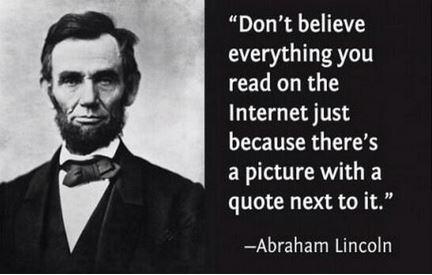There wasn't much to report on my current project, "Tom Swiftly", so I decided to
contemplate a few more ideas I've bounced around recently.
While Abraham Lincoln did contribute more than his share of
important quotes to posterity, many quotes you see attributed to him on the
Internet are simply made up. Often that is done with the intent of adding
credibility to a questionable idea.
When I first noticed this tendency, I thought that the
primary reason for misquotes was that people would remember a quote from
someone is the 1800s, but forget who said it. Since Lincoln was someone they did remember, they
would give him the credit. I thought of that as "The Lincoln effect"
and I wondered if it was common with other famous people.
At one time I thought of using a made up Lincoln quote to promote my work. Something
like: "James Morison is one of the most creative people on the Internet
and you should support him with a donation." I felt a bit guilty about
making such a bold statement, so I decided to add in a qualifier: "Lincoln really did say
this, albeit the words were not in the same order and he didn't say them all at
the same time." I know that Internet
is a bit of stretch, but I'm sure he used both "inter" and
"net".
Thoughtless Tank
About six years ago I came across a number of small think
tanks in the course of my work. In reality they were one person operations. I
wouldn't really consider a one person organization a think tank, but it made me
wonder if I could set up my own think tank.
I never did, but the idea I developed was to create a
"Thoughtless Tank". It would be a satire of some of the low value
think tanks that vie for our attention. I think there is a lot of very
superficial work done by some of these think tanks. I never developed the
concept any further than that. Maybe if I had come up with a good name for it,
I would have moved forward.
I want peace, justice
and prosperity for everyone in the world, but can't find them anywhere on
Amazon
I really mean this. If you can find them on Amazon, please
let me know. I just hope they are cheap enough for my budget.
The secret cabal
running the world isn't doing a very good job. Maybe it is time that they step
aside and let another secret cabal try.
Many conspiracy theories posit the existence of a secret
group that runs the World's affairs. What struck me about this theory is that
if there is a secret group is running things, they don't seem to be doing a
very good job. Even if you assume they are totally in it for their own
aggrandizement, they don't seem to be doing that well for themselves.
Some people assume that the secret cabal is evil. I think Hanlon's
razor is a better explanation: Never attribute to malice that which is
adequately explained by stupidity.
If this secret cabal does exist, it should seriously
consider turning things over to another secret cabal who can do a better job.
If aliens visited
earth in ancient times, where are they now?
This is one of the things I've thought about the ancient
astronaut theory. While it is a plausible hypothesis that alien beings visited
Earth in the past, I haven't heard of anything that doesn't have a more
plausible explanation. Namely, people in ancient times were just as smart as we
are now.
I know some people will say that they are still here, but
hiding. I suppose that is possible, but if that were the case, then why were
they so open in ancient times?
Maybe this idea could be the basis for a story. These are
some of the questions we could ask when we develop such a story:
- Did
they leave?
- Why
did they leave?
- Where
did they go?
- When
did they go?
- How
long did they stay?
- Did
they die out?
- What
killed them?
- How
long were they here?
- Did
they hide?
- Where
did they hide?
- Why
did they hide?
- Why
did they come here in the first place?
This post is a mirror from my main blog http://www.dynamiclethargyfilms.ca/blog
